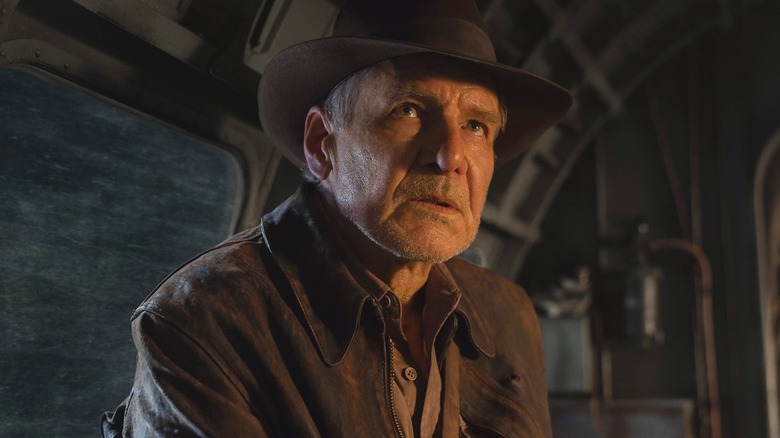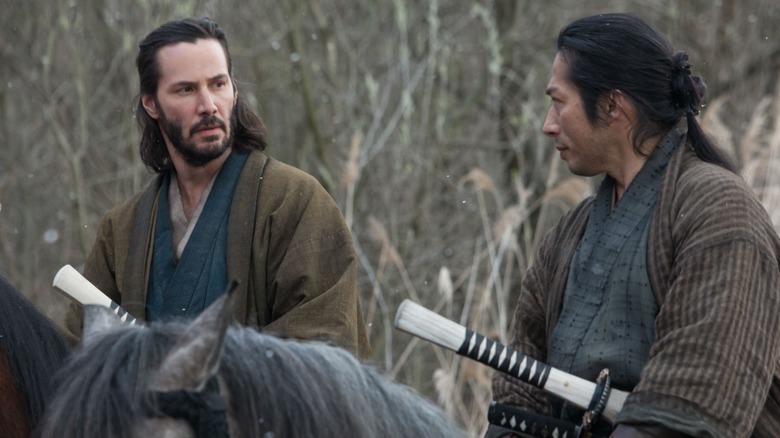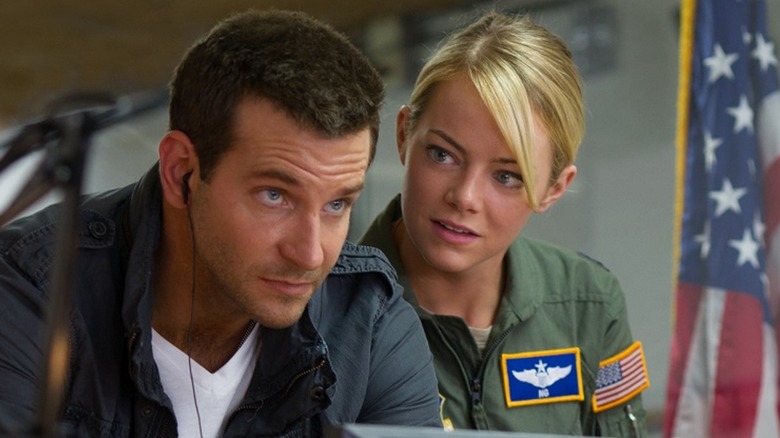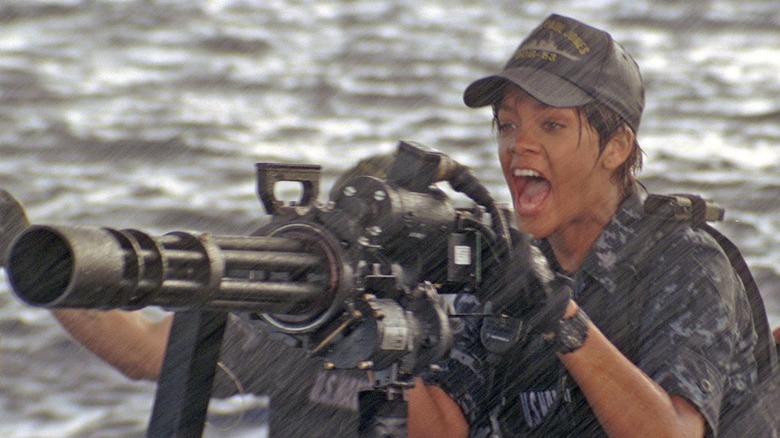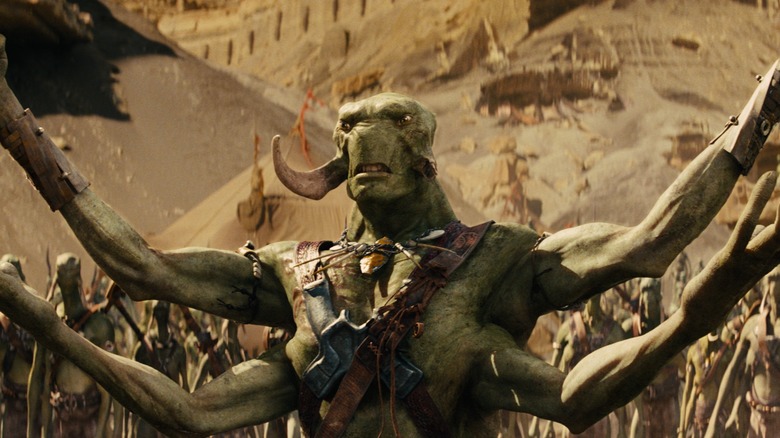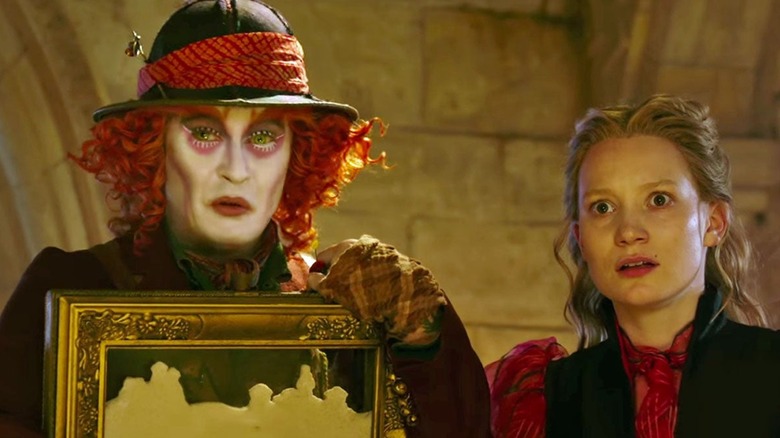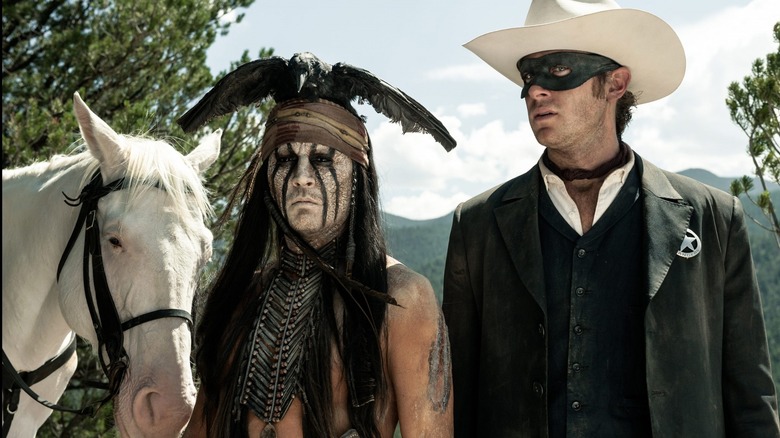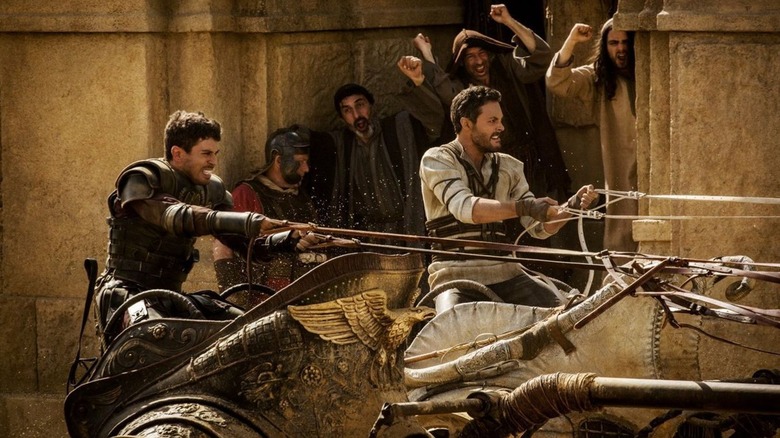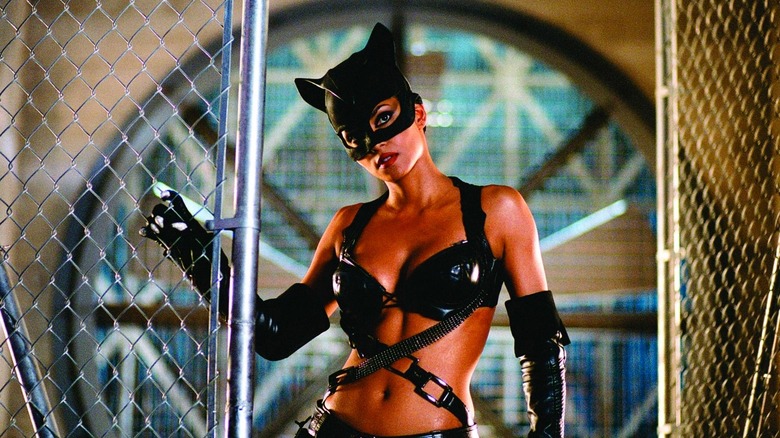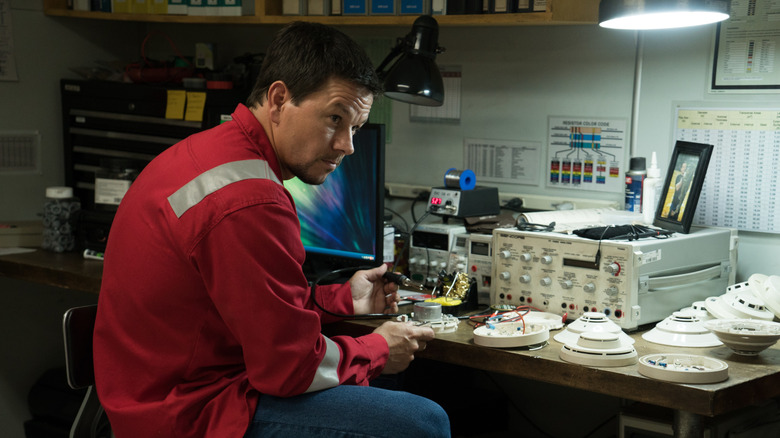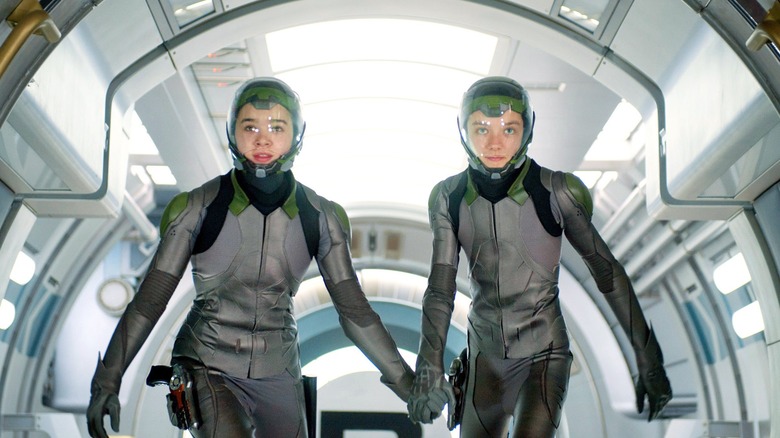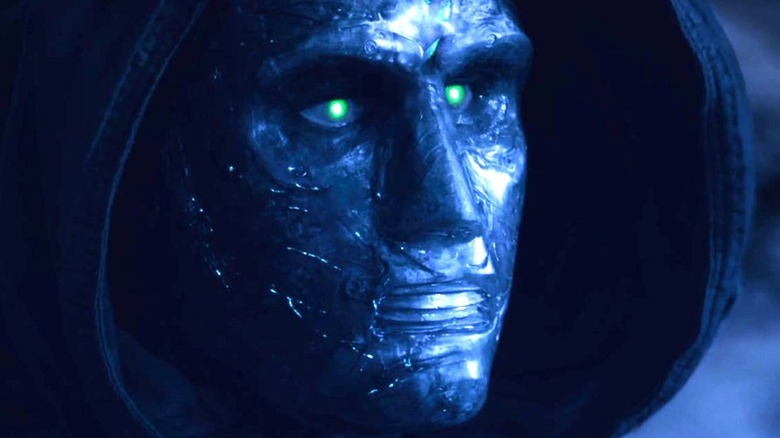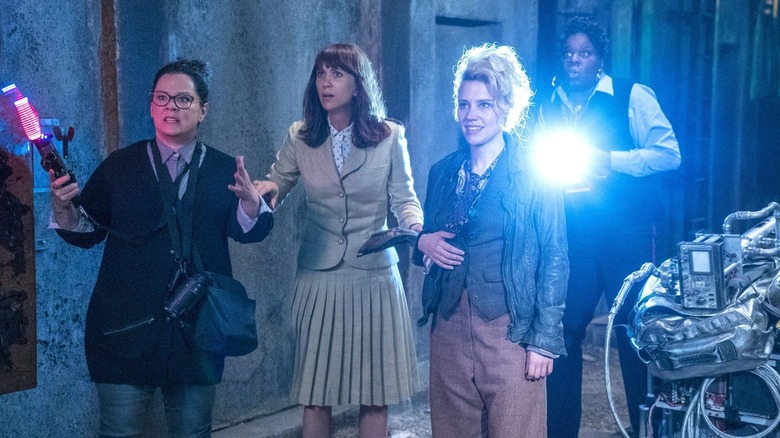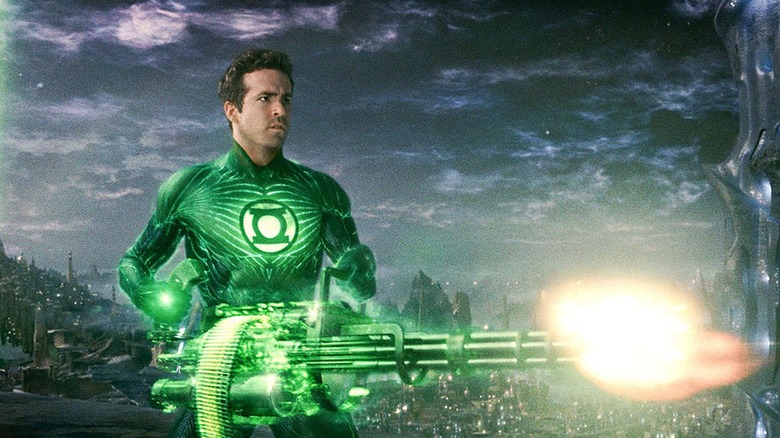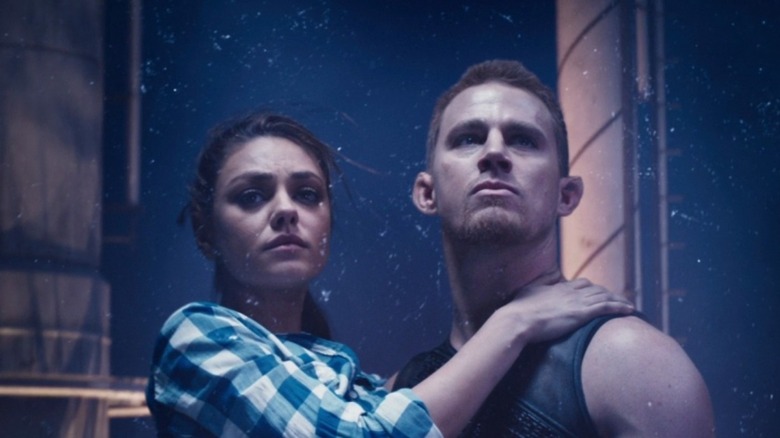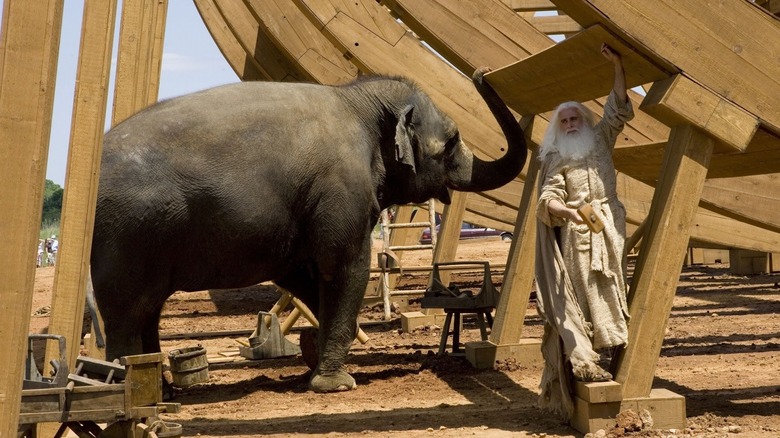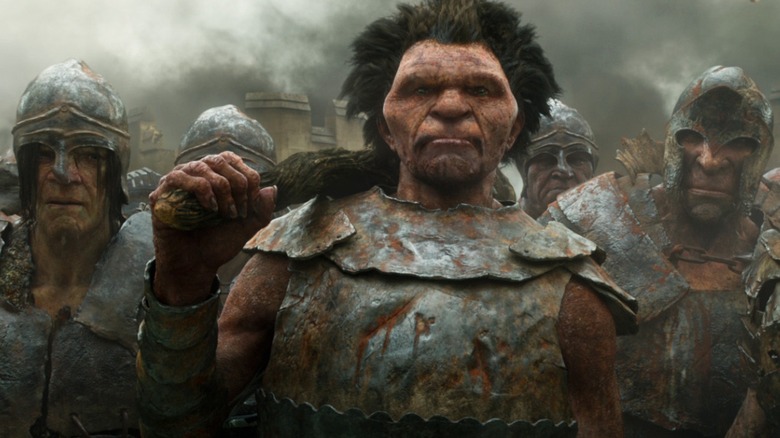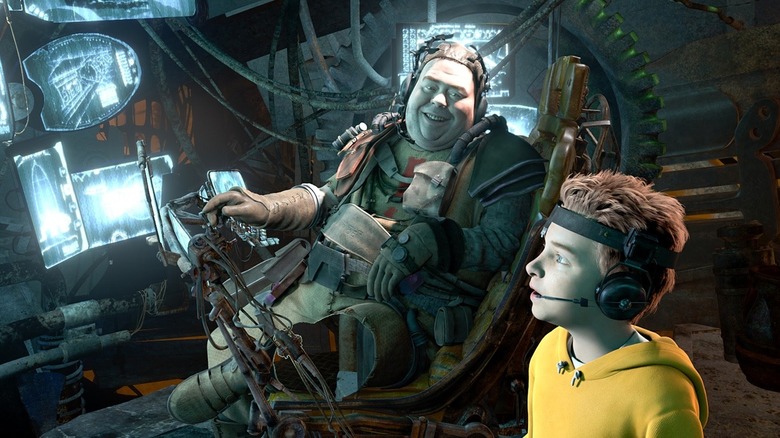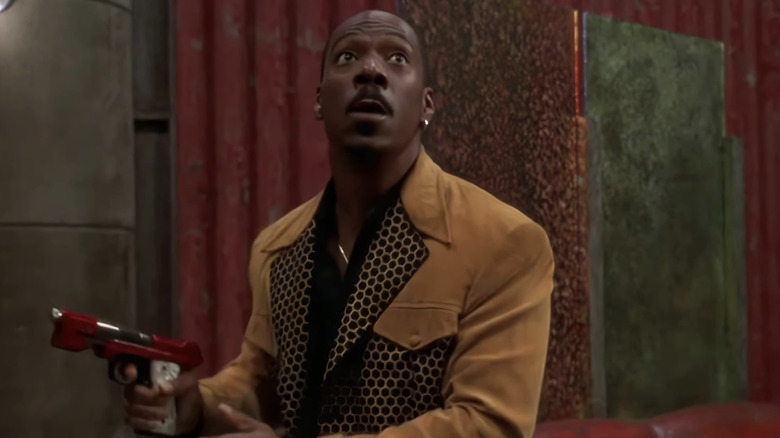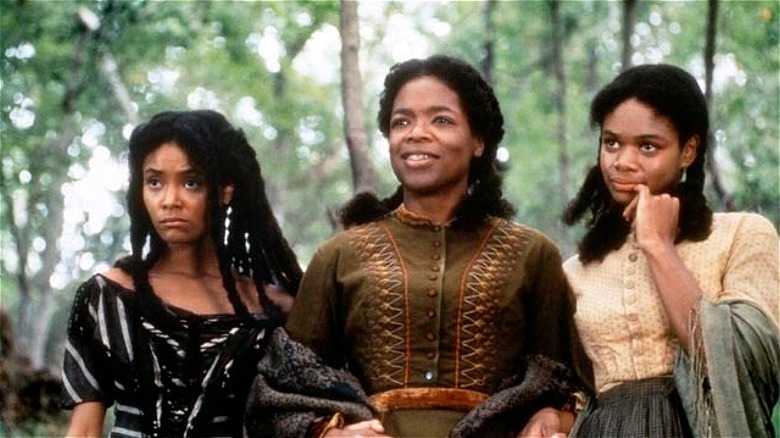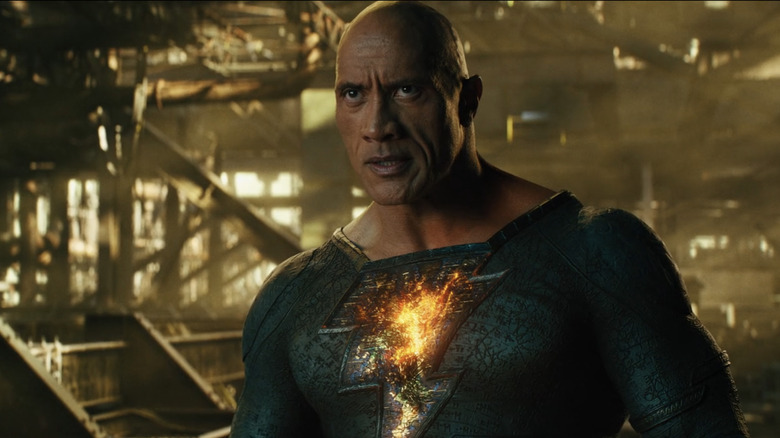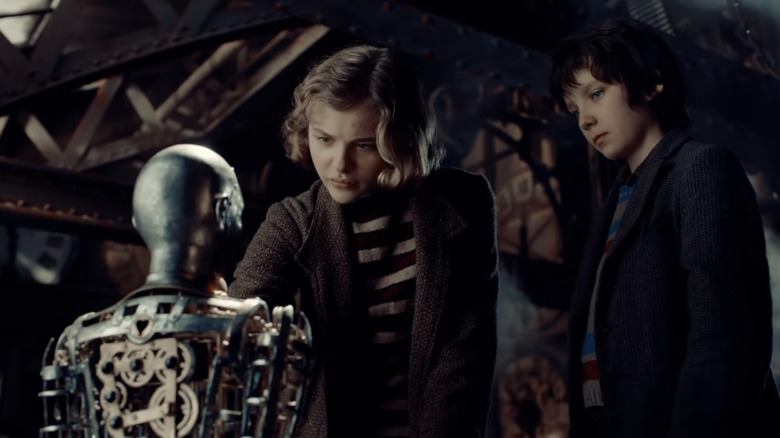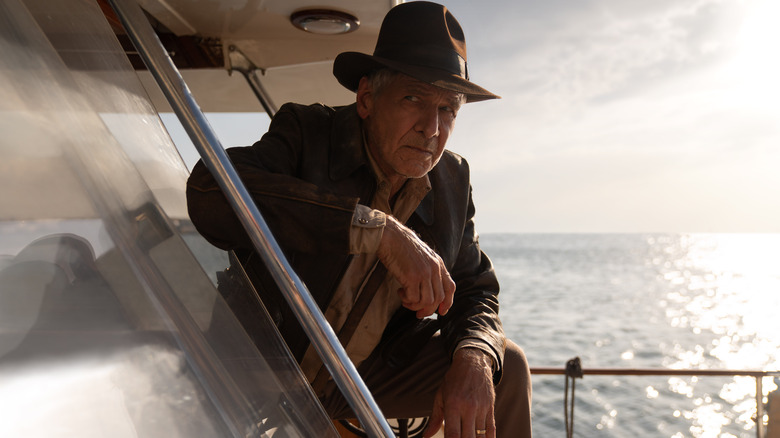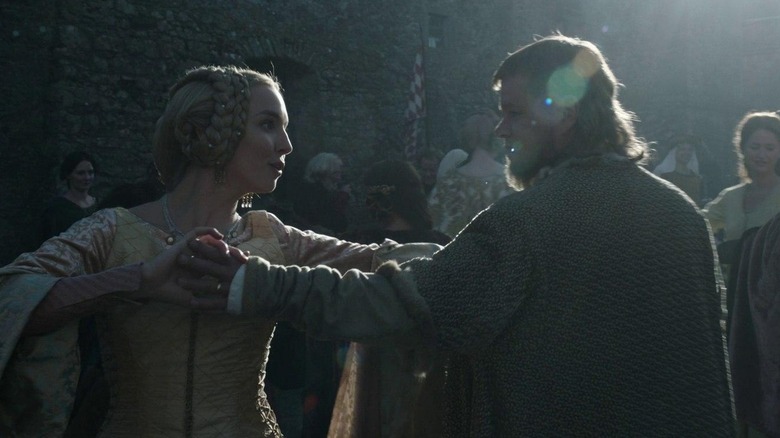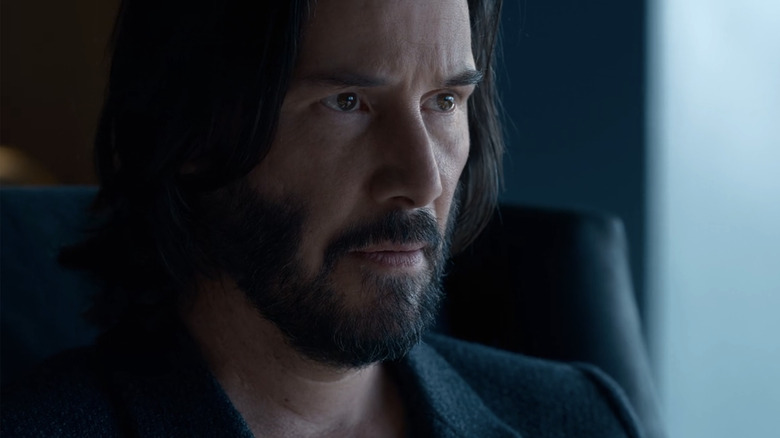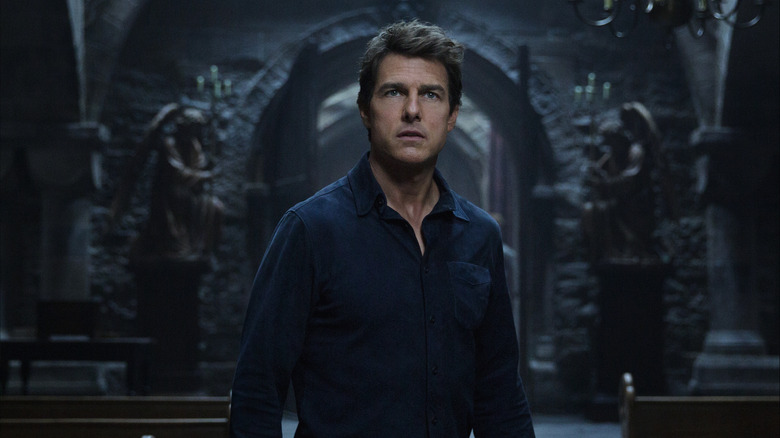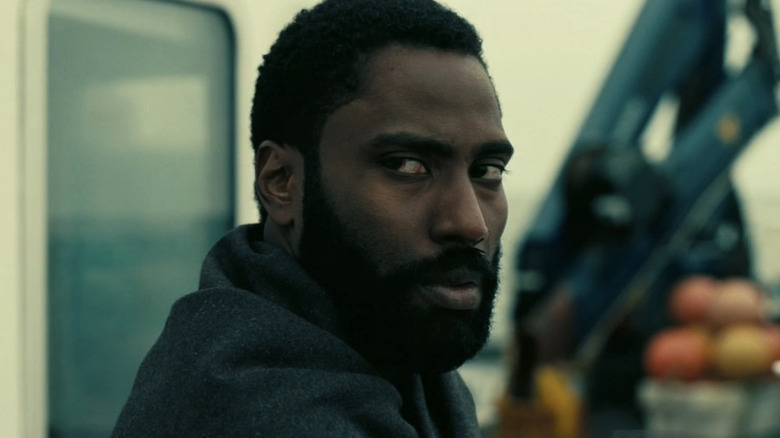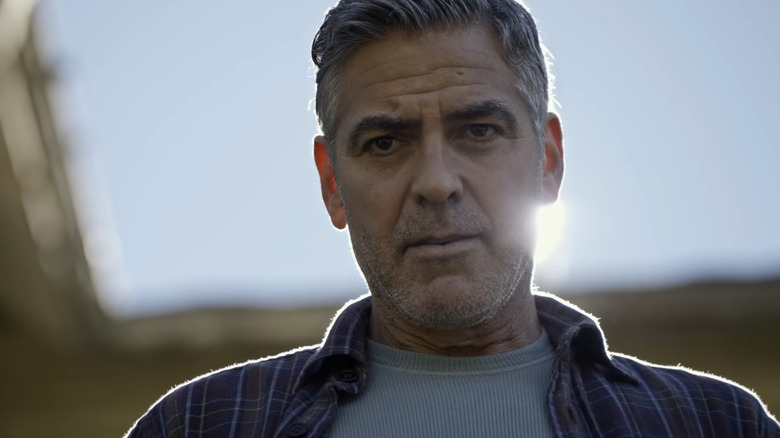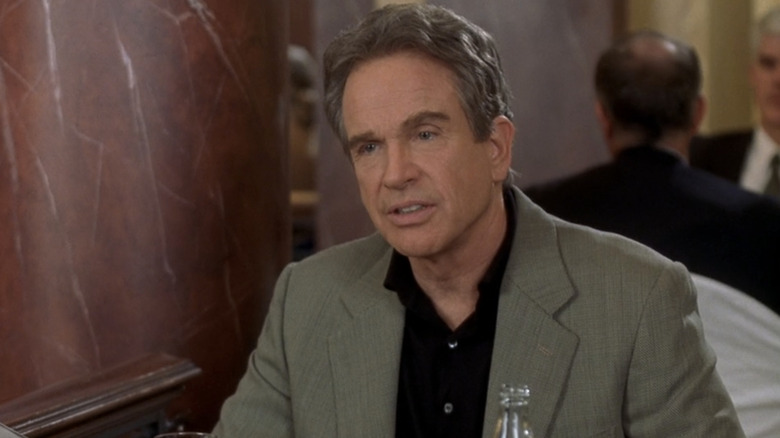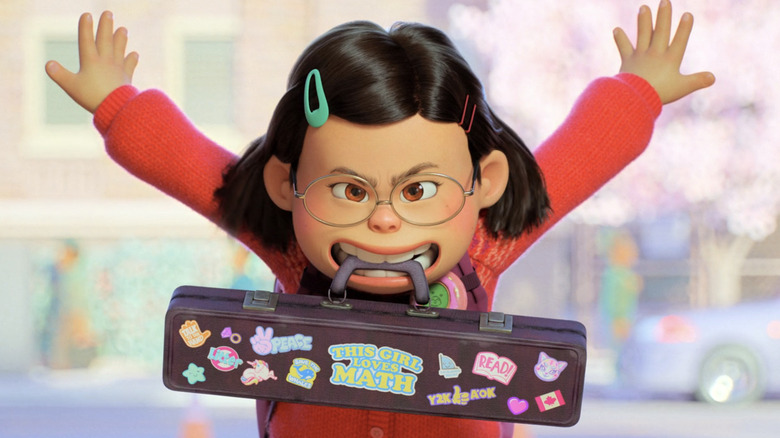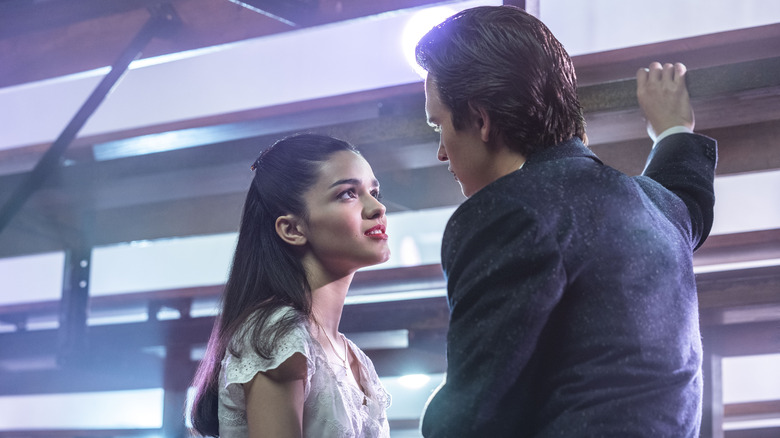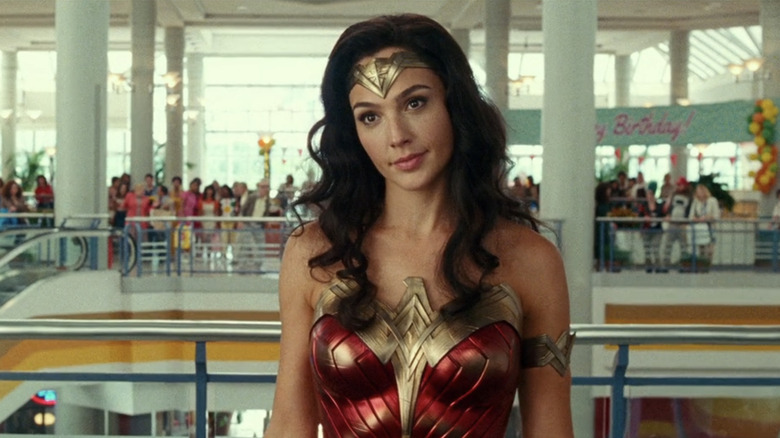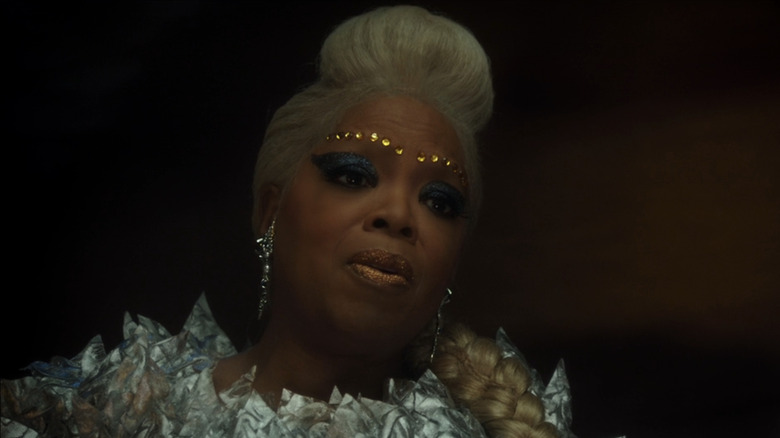Movie Flops That Hollywood Was Sure Would Be A Hit
We're all familiar with how much market testing can go into a product before Hollywood deems it fit to unleash on your neighborhood cineplex. From following established trends to forcing filmmakers to submit to test screenings, there are countless ways studio execs can hedge their bets when they're hitching their wagon to someone's creative vision — and for all those best laid plans, there's really never any guarantee that it'll end up producing the desired results.
Yes, there's nothing like the anticipation of a multi-mega-million-dollar movie making its theatrical debut... and there's also nothing like the agony of watching a would-be blockbuster go down in flames. Not every big-budget Hollywood spectacular makes bank at the box office — and sometimes, even the finest minds at the studios and their marketing think tanks can end up being completely wrong about what will or won't perform. These films have been among the biggest disappointments.
47 Ronin
With a mega-million-dollar budget, a reliable kung-fu fighter as its star, a plot that included both samurais and dragons, and a crowd-pleasing Thanksgiving release, "47 Ronin" was supposed to be the kind of action-packed blockbuster that makes for a reliable end-of-year hit—an ambitious, dazzling fantasy in the vein of "Lord of the Rings" or "Harry Potter" that would draw American audiences in droves while also making a splash in the lucrative Asian markets.
Unfortunately, the behemoth of a movie turned out to be too unwieldy for its first-time director, Carl Rinsch. Plagued by problems and requiring extensive reshoots, it was delayed by more than a year—and despite the biggest, best Christmas push the studio could muster, "47 Ronin" bombed to the tune of $151 million worldwide, less than its $175 million budget.
Aloha
This romantic comedy was supposed to be a winning return to form for Cameron Crowe, the Oscar-winning writer and director who had us at hello in the '90s with "Jerry Maguire." "Aloha" had so much going for it: a scenic setting, a sweet plot, and an A-list cast that included the incontrovertibly adorable Emma Stone, an actress everyone likes.
But between accusations that Crowe had "whitewashed" the diverse face of Hawaii, limited pre-release access for reviewers, and a studio head who privately disliked everything about the film from the get-go, the movie landed at the box office with a dull thud and never recovered. Its gross was a sad $26 million, leaving it more than $10 million shy of earning back its budget.
Battleship
The "who sunk this Battleship?" jokes write themselves when it comes to this $300 million albatross around Universal. "Battleship" had all the makings of a big summer blockbuster, with a cast of well-muscled dudes at its helm and high hopes of leveraging the same '80s-kid nostalgia that made the "Transformers" franchise such a giant moneymaker — complete with a tie-in to capture the lucrative video game market.
At the box office, though, "Battleship" suffered from bad timing (it couldn't compete with the release of "The Avengers" that same weekend), bad press, and alas, a bad reputation for leading man Taylor Kitsch, who'd starred in one of Hollywood's worst flops, "John Carter," just two months earlier. Although the movie technically made back its production budget once it hit international waters, it still left Universal taking an $83 million bath.
John Carter
The unbelievably high expectations for this tragic bomb of a movie may just be one of Hollywood's great mysteries — because in hindsight, its belly-flop at the box office should've been a foregone conclusion. Taylor Kitsch was a popular cast member on "Friday Night Lights" prior to being cast as the titular hero of "John Carter," but he was hardly a bankable star on which to anchor a $250 million space opera, especially not one based on an early 20th century sci-fi novel by Edgar Rice Burroughs.
That's exactly what Disney did — a problem compounded by one of the most grossly mishandled marketing campaigns in the history of cinema (including a now-infamous Super Bowl ad that left audiences completely confused). Ultimately, "John Carter" was an earth-shattering disappointment, bringing in $284 million worldwide against a $250 million budget.
Alice Through the Looking Glass
After Tim Burton's "Alice in Wonderland" became a billion-dollar hit at the box office, a sequel was a foregone conclusion — the thinking being that even without Burton at the helm, audiences would definitely pay to see Johnny Depp romping 'round the director's visually stunning Wonderland a second time. But despite an ensemble cast of A-listers and just as much mad hattery as the first film, "Alice Through the Looking Glass" failed to replicate the magic of its predecessor ... to the tune of a paltry $34 million opening weekend. ("Alice in Wonderland," by comparison, made more than three times that much right out of the gate.)
Derided by critics as a lazy, hollow retread, "Alice Through the Looking Glass" was overshadowed by both the simultaneous release of "X-Men: Apocalypse" and a scandal surrounding its leading man, as Depp's soon-to-be-ex-wife Amber Heard made shocking allegations that the actor had physically abused her.
The Lone Ranger
2003's "Pirates of the Caribbean: Curse of the Black Pearl" marked Johnny Depp's transition from indie darling to blockbuster leading man. In the decade that followed, Depp's presence was a fairly reliable predictor of a film's success — or in the case of "The Lone Ranger," its saving grace. Looking to recapture the surprise success of "Pirates" by reteaming Depp with director Gore Verbinski, Disney pegged this movie as a big moneymaker at the outset, pumping a reported $215 million into the production.
Even once it became clear that "The Lone Ranger" wasn't going to break any box office records, nobody expected a film that harnessed Depp's star power to tank. But it did: early reports estimated losses in the neighborhood of $190 million, and although the final numbers were a fair sight better than that — the movie grossed $260 million worldwide — marketing costs more than likely still pushed the studio's investment in the picture into the red.
Ben-Hur
In this, the golden age of reboots, it was only a matter of time until someone made a CGI-heavy summer blockbuster out of the classic chariot-racing drama "Ben-Hur." Based on one of Hollywood's favorite novels ("Ben-Hur: A Tale of the Christ" has been adapted for the screen five times), "Ben-Hur" had a $100 million budget and a promising premise — the sweeping epic history of a" Gladiator mashed up with the edge-of-your seat action of a "Fast and the Furious."
Alas, where previous Bens Hur had been big successes at the box office (the 1959 version starring Charlton Heston notably won an Oscar), this one tanked. Variety declared it the biggest bomb of the summer after an $11.4 million opening weekend, and later reported that the film had cost MGM a writedown of $48 million.
Catwoman
It's hard to believe this notorious bomb of a movie was once supposed to be a huge hit, but in 2004, dressing up Academy Award-winning actress Halle Berry like a butt-stomping, leather-clad feline sure seemed like a recipe for raking in the bucks. "Catwoman" was a cool character already beloved by Batman aficionados, superhero flicks were reliable box-office draws, and Berry looked fan-freaking-tastic in a leather brassiere and artfully shredded pants. What could go wrong?
Alas, the movie apparently blew all of its $100 million budget on leather underwear and CGI cats, leaving nothing left over to pay for things like, say, a coherent script. Ultimately, the movie's domestic gross was an abysmal $40 million — and Berry, who showed up in person to collect her Razzie award for the film, was not shy about registering her agreement with the critics who thought "Catwoman" was the artistic equivalent of a hairball on the carpet.
Deepwater Horizon
Although movies based on true-life disasters can be hit or miss, Hollywood had every reason to believe they had a hit on their hands with "Deepwater Horizon." The movie had a setting and a premise that was made for the big screen — in the form of a massive explosion on an oil rig in the Gulf of Mexico — and a star, Mark Wahlberg, with a solid history of well-performing movies in which he plays an ordinary guy caught in the center of an extraordinary disaster. (See: "Patriots Day," "The Perfect Storm," "Lone Survivor," etc.) But where Wahlberg and director Peter Berg were able to make a sleeper hit of "Lone Survivor," their far more expensive reunion in "Deepwater Horizon" couldn't capture that same box office magic.
Whether due to poor marketing choices, a bloated budget, or the continued negative connotations of the words "deepwater horizon" themselves, the movie was one of the biggest flops of the year in the U.S., where it brought in a disappointing domestic gross of $61.4 million. The worldwide numbers improved the picture, bringing the total take to $121 million, but with marketing costs taken into account, it still added up to a rare — and expensive — misfire for Berg and Wahlberg.
Ender's Game
Based on a classic science fiction novel by Orson Scott Card, set in outer space, and with a cast that included wunderkind Asa Butterfield and everyone's favorite star warrior Harrison Ford, "Ender's Game" was a movie with seriously high hopes. (The words "the next 'Hunger Games'" may or may not have been uttered in the lead-up to its release — though not all critics were sold on the idea.)
Despite the box-office promise of a big-budget movie about teen soldiers battling hostile aliens while the fate of the Earth hangs in the balance, "Ender's Game" was plagued by issues, including the ill effects of a boycott from groups who were angered by author Orson Scott Card's stance on LGBTQ marriage. Between the bad press stemming from that and mixed reviews from critics, it only ended up earning $125 million worldwide against a $110 million budget.
Fantastic Four
After a slightly cheesy but successful pair of "Fantastic Four" films rocked the box office in the early 2000s (and after "The Amazing Spider-Man" proved that it's never too soon to reboot a promising superhero franchise for a new generation), a fresh round of films featuring the Human Torch, Invisible Woman, and Mr. Fantastic seemed like just (ahem) the Thing for an up-and-coming director.
Josh Trank, who'd done great things with the found-footage thriller "Chronicle," was tapped to helm the new "Fantastic Four," with a cast that included Miles Teller, Michael B. Jordan, Kate Mara, and Jamie Bell — serious stars, all. Producers were counting on the foursome to become the next big thing in superhero ensembles, alongside the X-Men and the Avengers. What they weren't counting on, unfortunately, was for Trank to clash with the studio and (reportedly) behave so erratically on set that Fox felt compelled to reshoot huge portions of the movie after the fact. The release was overshadowed by scandal, and the finished product was ghastly by all accounts ... which makes it unsurprising that the film took in only $26.2 million on its opening weekend and $167 million worldwide, against an estimated $200 million production and marketing budget.
Ghostbusters (2016)
With everyone from Beyonce to Taylor Swift striking blows for feminism, and female-led movies like "Bridesmaids" raking in millions, Hollywood in 2016 had every reason to believe an all-lady reboot of the classic "Ghostbusters" franchise would be a veritable cash cow they could milk until the end of time with sequel after sequel. That it meant a reunion between "Bridesmaids" director Paul Feig and stars Melissa McCarthy and Kristen Wiig only sweetened the deal, as did the involvement of "SNL" stars Kate McKinnon and Leslie Jones.
Despite a tidal wave of buzz, the publicity failed to translate into dollars at the box office. The movie was expensive to make — $144 million for production alone — and would have needed a worldwide gross of $300 million (or even $500 million, per the director himself) to break even. Sadly, it didn't even come close; the final worldwide gross was $229 million.
Green Lantern
Nowadays, "Green Lantern" is such a notorious loser that even star Ryan Reynolds couldn't resist using it as a punchline in his other, far more successful superhero flick. But back in 2011, the movie seemed like a sure thing for many of the same reasons that "Deadpool" did. Namely: a) Ryan Reynolds, in b) skin-tight spandex, playing c) a lesser-known comic-book superhero who d) opened up fun and exciting possibilities for extending the (in this case) DC Universe onscreen.
Sadly, this formula fizzled — and critics were not charitable with their assessments. "Green Lantern" had a decent opening weekend, but for a film that cost $200 million for production alone, its $219 million worldwide take was a huge disappointment.
Jupiter Ascending
Visually stunning, wholly original, and with the imprimatur of the famously inventive Wachowski sisters — 2014's "Jupiter Ascending" was perfectly positioned to be an epic sci-fi success, even before it tapped two of the coolest kids in Hollywood (Mila Kunis and Channing Tatum) as its stars. This story of a cleaning lady who learns she's the heir apparent to an intergalactic empire had the full force and faith of big money behind it, to the tune of a $176 million production budget.
But the Wachowskis reportedly overspent on the film, test audiences were unimpressed, and the critical reception was extremely chilly — all adding up to a worldwide take of $183 million (i.e. not enough to break even once you factor in the tens of millions spent on marketing).
Evan Almighty
Audiences love Steve Carell, which is almost certainly what Hollywood was thinking when they threw $175 million worth of production money at "Evan Almighty." A sequel to the Jim Carrey-led "Bruce Almighty" (which raked in $484 million worldwide against a comparatively teensy $81 million budget), this movie gave Carell's supporting character from that film his turn in the spotlight and was supposed to be a crowd-pleasing summer comedy the whole family could enjoy.
Unfortunately, Carell was working with a not-particularly-great script and an exorbitantly expensive cast of CGI wildlife, and not even his considerable charms could float a film critics derided for being preachy and unfunny. A late-summer push got "Evan Almighty" past the $100 million mark, but that was a small (and ultimately insignificant) victory compared to its overall shortfall.
Jack the Giant Slayer
With a familiar fairy tale at its center and a blockbuster director at its helm (before misconduct allegations would come to define his career), Bryan Singer's "Jack the Giant Slayer" should have been a solid moneymaker at the box office, if not a gia — er, huge hit. In fact, the film was so readily expected to be a success that even the folks who analyze movie flops for a living struggled to explain its dismal performance. Was it the March release date? The lack of a franchise tie-in? The too-prominent involvement of a loathed vegetable in the marketing push?
Whatever the reason, "Jack" did so badly out of the gate that pundits immediately compared it to "Jack Carter," which needless to say was not good news. Warner Bros. reportedly pumped close to $200 million into the CGI adventure, plus another $100 million for marketing; with a global gross of $197 million, poor "Jack" ended up more than $100 million in the hole.
Mars Needs Moms
If you've never heard of "Mars Needs Moms," join the club; the total lack of name recognition for this movie is just one reason why it became one of the most gratuitous box office flops in history. But on paper, it had all the makings of a hit: a renowned producer in Robert Zemeckis, a fresh visual landscape thanks to burgeoning motion-capture technology, and a family-friendly plotline with a cool alien twist.
But even after forecasters tempered their expectations for "Mars Needs Moms" in light of a less-than-enthusiastic response to test screenings, nobody anticipated what an unmitigated disaster the release would be. Not counting the cost of marketing, "Mars Needs Moms" cost $150 million to make — and even with international ticket sales, its total revenue was just shy of $39 million, making this film a record-breakingly expensive bath for Disney.
The Adventures of Pluto Nash
At the turn of the millennium, Eddie Murphy was riding high from a string of high-concept, family-friendly hits like "The Nutty Professor" and its sequel, "Doctor Dolittle" and its sequel, and the first "Shrek." But good times never last forever. First there was a pair of misbegotten buddy comedies in "I Spy" with Owen Wilson and "Showtime" with Robert DeNiro. Then, in 2002, there was "The Adventures of Pluto Nash," a disastrous sci-fi action comedy that remains one of the biggest box office bombs in history, grossing just over $7 million worldwide against a $100 million budget.
It's difficult to pin down exactly what went wrong with "Pluto Nash." Murphy is in his Axel Foley wheelhouse as the title character, a fast-talking nightclub owner on the moon trying to protect his business from the lunar mafia while romancing a very young Rosario Dawson on the side. The cast is filled with ace character actors like Luis Guzman, Peter Boyle, Pam Grier, and Randy Quaid as an out-of-date robot. According to director Ron Underwood ("City Slickers"), the script was never quite up to par, leading to a years-long production filled with reshoots. A bad early review on the movie blog Ain't It Cool News prompted even more last-minute revisions, and the film slouched into theaters as if embarrassed of itself. Despite his popularity at the time, it seems that audiences were completely uninterested in watching Eddie Murphy go to space.
Beloved
Sometimes a film is a bomb because of how much it made at the box office, but other times it is a bomb because of how much it cost. The 1998 adaptation of Toni Morrison's Pulitzer-winning novel "Beloved" earned $21 million in four weeks, which would be a respectable gross for such a challenging, adult-oriented film, especially if it had been a small-budget indie. But "Beloved" was an $80 million Disney production released by Touchstone Pictures, produced by and starring Oprah Winfrey and directed by Jonathan Demme, whose previous feature was the Oscar-winning, $200 million smash hit "Philadelphia." The biggest talk show host in the country teaming up with one of the most successful directors of his generation to adapt a grim, haunting work by a Nobel laureate: All eyes were on "Beloved," and its failure at the box office was extremely public.
Winfrey stars as Sethe, a former slave living with her daughter (Kimberly Elise) and another former slave (Winfrey's "The Color Purple" co-star Danny Glover) in post-Civil War Ohio, whose makeshift family is threatened by Beloved (Thandiwe Newton), a spectral presence who may be the ghost of Sethe's first daughter. Demme and Winfrey kept the novel's nonlinear approach and stayed faithful to Morrison's unsettling visions. In hindsight, perhaps it was asking too much for a film like that to become a commercial hit, despite how well-recevied it was by critics. Winfrey reportedly fell into a deep depression, disappointed by the film's underperformance and humiliated that it was beaten in its first weekend by "Bride of Chucky."
Black Adam
The long, strange saga of Dwayne Johnson and "Black Adam" stretches back more than 15 years. The wrestler-turned-movie-star first announced his intention to play the DC Comics antihero in 2007. Over the years the project grew and mutated, gaining and shedding directors, existing in a perpetual "coming soon." Meanwhile, Johnson became one of the century's most recognizable and bankable leading men, and superhero movies became a license to print money. But when these two unstoppable box office forces finally combined in October 2022, the result was surprisingly lackluster. "Black Adam" fared well overseas, but only grossed $168 million in the US, which, for today's top-heavy tentpole releases, was a disappointment, if not an outright disaster.
So what happened? The film was caught in a perfect storm of shifting cultural trends and corporate chicanery. The COVID-19 pandemic had forced delays in filming, and the release date was pushed back from July 2022 to October to accommodate health concerns about large indoor gatherings. But even after postponing four months, audiences were still understandably shy about packing multiplexes for a character they didn't already know and love like Spider-Man or Batman. For hardcore comics fans excited to see Hawkman and Dr. Fate on screen for the first time, the film and its Henry Cavill cameo were dead on arrival, as it was clear that the new Warner Bros. Discovery regime was uninterested in maintaining the old DCEU continuity. Sure enough, two months after the film's release Johnson released a statement confirming that there would be no "Black Adam 2."
Hugo
Martin Scorsese's 2011 family film "Hugo" is arguably the most lauded title on this list. Based on Brian Selznick's YA novel "The Invention of Hugo Cabret," the film was a critical success, appeared on over two dozen best-of lists at the end of the year, won five Oscars and was nominated for six more, including Best Picture. It is a technical marvel, a tribute in both form and function to the magical days of early cinema from one of the medium's true masters. It was also an utter box office bomb — not even the premium charge for 3-D tickets could save it.
Originally budgeted at $100 million, the cost of creating Scorsese's dreamworld version of 1930s Paris, full of movie-loving orphans and clumsy gendarmes, went north of $150 million and made less than half that in U.S. theaters. And while the trailers promised a fantastical kids' adventure with the eponymous Hugo (Asa Butterfield) living in the walls of a train station, the actual film is more concerned with the spiritual rehabilitation of real-life cinema pioneer Georges Melies (Ben Kingsley), whose work went missing after World War I. Perhaps this subject was a bit too esoteric for families who had plenty of other options at the multiplex that Thanksgiving weekend, including "The Muppets," "Happy Feet Two," and "Puss in Boots."
Indiana Jones and the Dial of Destiny
Talk of a fifth "Indiana Jones" movie started not long after the release of the fourth, 2008's massively profitable "Indiana Jones and the Kingdom of the Crystal Skull." But it would take another 15 years for "Indiana Jones and the Dial of Destiny," presumably the last film in the legendary adventure series, to see the light of day. When it finally hit theaters in July 2023, it came with a new studio (Disney instead of Paramount), a new director (James Mangold stepping in for Steven Spielberg), and a reportedly gigantic $300 million budget (plus another $100 million on top for marketing costs).
There would seem to be no surer bet in Hollywood than a new Indiana Jones movie, and yet "Dial of Destiny" faced a surprisingly uphill battle. Details of the plot were kept top secret, which allowed a rumor — that the film would use time travel to replace straight white man Indy with "woke" lady adventurer Helena Shaw (Phoebe Waller-Bridge) in all the previous movies — to flourish among the reactionary wing of Indy fandom. Then the film premiered at the Cannes Film Festival a full five weeks before opening in theaters, and its tepid reception there quickly lowered expectations for its domestic release.
"Dial of Destiny" had a $60 million opening weekend, and though the overall critical response has been kinder than at Cannes (69% fresh on Rotten Tomatoes as of September 2023), the film's bloated budget and underperformance at the box office have doomed it to be a flop.
The Last Duel
Who is to blame when a movie flops? There are dozens, if not hundreds of variables that weigh on a film's success or failure, and the quality of the film itself is sometimes the least important. For director Ridley Scott, however, the blame for his 2021 medieval epic "The Last Duel" falls squarely and solely on the backs of those darn millennials and their phones. "The millennian do not want to be taught anything unless you are told it on the cell phone," he groused to Marc Maron (via Variety) after the film opened fifth at the box office behind a string of sequels that included "Halloween Kills" and "No Time to Die."
Back in 2019, though, "The Last Duel" was a hot commodity, a real-life tale of 14th century justice whose themes of power and patriarchy made it a perfect fit for the #MeToo era. Matt Damon and Ben Affleck were set to not only star but script together for the first time since "Good Will Hunting," alongside filmmaker Nicole Holofcener. Affleck eventually took a smaller supporting role and Adam Driver stepped in as the young knight challenged to a duel by a fellow soldier (Damon) for the offense of assaulting the man's wife (Jodie Comer). Delayed nearly a year by the pandemic, the film sank like a stone at the box office, but later found its audience — a little older, a little more open to serious films — on home video and streaming. Maybe Scott was right about millennials after all.
The Matrix Resurrections
Is 2021's "The Matrix Resurrections" yet another example of studios shamelessly strip mining their IP for parts and cashing in on judgment-free millennial nostalgia, or a harsh criticism of the same by a filmmaker with nothing to lose? In this case, it's likely both. Director and co-writer Lana Wachowski (working without sister Lilly) took a bitterly meta route with the nearly two-decades-late sequel, crafting a world in which both the Matrix and "The Matrix" exist, and where the corpses of Neo (Keanu Reeves) and Trinity (Carrie-Anne Moss) have literally been pieced back together in order to provide power for the machines' failing infrastructure.
Back in the real world (or is it?), the film was having its own battle with the unintended consequences of a runaway technology: Streaming. At the height of the pandemic, Warner Bros. instituted a simultaneous release policy, wherein theatrical films would be available on HBO Max (as it was known at the time) for the first 30 days of release. For "Resurrections" the result of this strategy was so disastrous — a $10 million opening weekend on just over 3,500 screens — that producers Village Roadshow Entertainment sued Warner Bros. for breach of contract, claiming that the studio intentionally gutted the film's box office in order to increase end-of-year subscriptions. The film would go on to gross just $157 million worldwide against a reported $190 million budget, and in the two years since its release there has been no talk, officially or otherwise, of another sequel.
The Mummy (2017)
Of all the attempts to recreate the success of the Marvel Cinematic Universe over the last decade-plus, the one that made the most sense on paper was Universal's "Dark Universe," which would have rebooted the studio's stable of classic movie monsters and let them run amok together. There was even precedent for it, in the 1943 classic "Frankenstein Meets the Wolf Man." After Universal's first attempt at kickstarting a monsterverse, 2014's "Dracula Untold," was unsuccessful, they came back three years later with "The Mummy," an ungainly beast of a film about an Army officer (Tom Cruise) who accidentally awakens a vengeful undead Egyptian princess (Sofia Boutella) and discovers an entire world of supernatural threats.
In an extreme case of putting the cart before the horse, Universal announced an entire slate of Dark Universe pictures, including remakes of "The Invisible Man" starring Johnny Depp and "Bride of Frankenstein" with Javier Bardem and Angelina Jolie. Russell Crowe's Dr. Henry Jekyll (and his monstrous alter ego, Mr. Hyde) would be the Nick Fury-like connecting tissue between the films, leading up to the inevitable "Avengers"-style monster mash. Alas, it was not to be, as "The Mummy" was a critical and commercial failure, collapsing into dust at the box office like an ancient corpse buried in the desert and taking the entire Dark Universe down with it. Years later, all that remains of this experiment in corporate hubris is a Dark Universe X (formerly Twitter) account, still promising "gods and monsters" to come.
Tenet
As COVID spread across the world in 2020, prompting quarantines and prohibitions against large public gatherings, movie studios had a tough choice to make about the films they had scheduled for release. Do they push the entire slate back, hoping that public health conditions will improve? Do they hold back their biggest releases and let smaller films play to mostly empty theaters? Or do they keep those big films on the calendar in the hopes of luring audiences out of their homes? Most studios opted to delay releases or premier them via streaming, especially after the underperformance of Christopher Nolan's "Tenet" in August of that year.
Every Nolan film is an event, but "Tenet" was event-ier than most, a massive spy-vs.-spy-with-time-travel action flick chock full of men in stylish suits, exploding airplanes, and reams of gibberish exposition. The film was made to be seen on the biggest screen possible, but arrived at a moment when people's lives depended on staying home. "Tenet" was delayed from June to late August due to health concerns, but the decision to release theatrically at all was met with controversy. Actor Seth Rogen, whose own film "An American Pickle" went direct to streaming, joked to The Hollywood Reporter at the time that Nolan seemed intent on "killing his greatest fans." The film flopped at the box office, earning just $58 million in the U.S., and its failure was a stark message to the rest of Hollywood: If Christopher Nolan can't get butts back in seats, there was little hope for anyone else.
Tomorrowland
Watching the three trailers released for Brad Bird's 2015 adventure "Tomorrowland," it's clear that Disney knew it had a visually striking film, but had no idea how to sell it. Each preview is by turns a "Peter Pan" riff, with a teen girl (Britt Robertson) whisked away to a magical land by a boy — er, man (George Clooney) — who never grew up; a "chosen one" save-the-world narrative, resembling a distaff, sci-fi gloss on Harry Potter; and a cracker-jack action adventure like Bird's previous feature, "Mission: Impossible – Ghost Protocol." All of these elements are in place in the film, co-scripted by Damon Lindelof ("Lost"), but what struck audiences and critics was its all-consuming earnestness about believing in the future, a wet-eyed sincerity that crossed over from corny into actively embarrassing.
The marketing was strong enough to earn "Tomorrowland" the number one spot at the box office over Memorial Day weekend, edging past "Pitch Perfect 2." But its fortunes quickly faded, and in the end it grossed just $90 million domestically against a budget of $190 million. Once critics and pundits had seen the film, much of the discourse was about its allegedly "Ayn Rand for kids" ethos. While Bird has always denied the libertarian bent some saw in "The Incredibles" and "Ratatouille," it's hard to look at Tomorrowland itself — a faraway land where visionaries can ply their genius away from the ignorant opinions of ordinary people — and not see a Disneyfied version of "going Galt."
Town & Country
Warren Beatty has accomplished a lot in his seven-decade career, and gotten away with even more. Before he married Annette Bening he was known as one of Hollywood's most notorious womanizers. He (probably) inspired the Carly Simon hit "You're So Vain." He had famed film critic Pauline Kael on his payroll for a time. He even got Faye Dunaway to read the wrong Best Picture winner at the 2018 Oscars. But some setbacks are harder to get past than others. Take "Town & Country," a long-gestating boondoogle of a middle-aged romantic comedy that sank like a stone when it was released in April 2001. The tale of an aging lothario (Beatty, natch) juggling the women in his life, it reportedly spent much of its $90 million budget on securing an A-list cast that included Diane Keaton, Andie McDowell, Goldie Hawn, Nastassja Kinski, Garry Shandling, and Jenna Elfman.
Though producers New Line Cinema must have had high hopes for the film when production began in 1998, by the time it stumbled into theaters three years later they had lost all confidence. "Town & Country" opened at a dismal 7th place at the box office, trailing far behind the likes of "Bridget Jones Diary," "Spy Kids," and even "Crocodile Dundee in Los Angeles." Director Peter Chelsom survived the debacle and went on to helm hits like the holiday rom-com "Serendipity." Beatty, meanwhile, took a break from filmmaking. He wouldn't appear back on the big screen until the 2016 Howard Hughes biopic "Rules Don't Apply."
Turning Red
When it comes to flops and failures, the numbers don't always tell the whole story. A massive box office take might actually be a failure if the movie cost too much to make. Or, a dismal gross on paper might only be half the story. Pixar's 2022 coming of age film "Turning Red," about a Chinese Canadian girl who transforms into a giant red panda, has a $20 million worldwide box office total. But what that number doesn't tell us is that "Turning Red" was never theatrically released in the U.S., or any other country that has access to Disney+. After debuting two Pixar films, "Luca" and "Soul," on the streaming platform in 2021, Disney initially planned for "Turning Red" to be Pixar's return to theatrical distribution. However, the Omicron variant surge at the end of 2021 scuttled those plans, and writer-director Domee Shi's feature debut became a Disney+ original instead.
So, there is a pretty big asterisk on the film's disastrous box office haul. But does that make it a secret hit? The world of streaming viewership ratings is notoriously vague and untrustworthy; apps like Netflix, Apple TV+, and Disney+ will tout successes and hide failures using metrics that are difficult to translate into something as concrete as ticket sales. "Turning Red" was the number one streamed film of its debut week, according to Nielsen's rankings of ad-supported streaming, with a reported 1.7 billion minutes watched. But how that translates to the theatrical experience, of audiences watching a movie from beginning to end, is anyone's guess.
West Side Story (2021)
After sneaking musical numbers into films like "1941," "Indiana Jones and the Temple of Doom," and "Hook," Steven Spielberg finally took his shot at not just a full-fledged movie musical, but one of the most popular movie musicals of all time: "West Side Story." Playwright Tony Kushner ("Munich," "Lincoln") adapted Leonard Bernstein and Stephen Sondheim's 1957 "Romeo and Juliet" riff about warring New York street gangs, emphasizing the Sharks' Puerto Rican heritage and placing their conflict with the white Jets in the context of a rapidly gentrifying midcentury Manhattan. The film was widely acclaimed, nominated for seven Oscars including Best Picture, and won Best Supporting Actress for Ariana DeBose's fierce turn as Anita. No one went to see it.
That's an exaggeration, of course, but not much of one. Whether it was the surging Omicron variant keeping older audiences away from theaters, a marketing campaign that deliberately downplayed that it was a musical, star Ansel Elgort's 2020 sexual assault allegation, or all of the above, moviegoers had little interest in a new "West Side Story." After being delayed a full year due to COVID-19, the film opened in December 2021 with a weekend gross of $10.5 million, just enough to beat "Encanto" for the top spot. The next week, however, it — and every other film in theaters — was trounced by "Spider-Man: No Way Home." "West Side Story" concluded its theatrical run with a worldwide gross of just over $76 million, a far cry from its $100 million budget or the estimated $300 million it needed to break even.
Wonder Woman 1984
As the pandemic upended the film industry in 2020, it seemed like any decision was the wrong one. To delay a film for months, if not a whole year, risked irrelevance. To push a film into theaters when shutdowns were ongoing seemed suicidal. To release a film in theaters and on streaming at the same time invited its own host of concerns, as audiences might quickly become used to big, first-run blockbusters being available on demand for free. After Warner Bros. took a bath on Christopher Nolan's "Tenet," which played exclusively in theaters without a streaming option, they took a different route with the superhero flick "Wonder Woman 1984." The Patty Jenkins-helmed sequel premiered in theaters and on HBO Max on Christmas Day 2020.
The first "Wonder Woman" in 2017 was a legitimate phenomenon, the highest grossing (domestically) and best reviewed film of the so-called DC Extended Universe. "1984," to put it mildly, was not. Critics were split as to whether its brighter, more comedic tone was a breath of fresh air after the dourness of DC's "Snyderverse" films, or too goofy to take seriously. At the box office the film pulled in just $46 million in the U.S., a stunning 90% drop from the first film's take three years earlier. But while "1984" was a disaster in theaters, it was a hit at home. HBO Max subscriptions reportedly doubled at the end of 2020, giving Warner Bros. the confidence to premiere its entire 2021 slate in theaters and on streaming simultaneously.
A Wrinkle in Time
Expectations for Disney's 2018 adaptation of Madeleine L'Engle's YA classic "A Wrinkle in Time" were high — arguably too high. A Time magazine cover profile of the film's creative team was titled "Hollywood's Once and Future Classic." Behind the scenes, producer Catherine Hand, writer Jennifer Lee ("Frozen") and director Ava DuVernay were calling the shots. On screen, there was young actor Storm Reid as plucky hero Meg Murry, alongside Mindy Kaling, Reese Witherspoon, and Oprah Winfrey as the otherworldly "Mrs. Ws," plus Chris Pine (whose involvement in "Wonder Woman" the year before gave him at least the sheen of feminist allyship) as Meg's missing father. In the lead-up to its release, the film really did feel like a turning point in Hollywood, a big-hearted, patriarchy-defying shot across the bow for the power of women in filmmaking.
One of the more pernicious aspects of that patriarchy, however, is that female-led films have to be larger than themselves, and their success — or in this case, failure — has to mean something. It's a visibility and significance that male-driven films rarely have to deal with. "A Wrinkle in Time" opened at number two at the box office in March 2018, finishing behind "Black Panther." Reviews praised DuVernay's heart and ambition, but ultimately found the film overstuffed and underdone. It made $100 million at the domestic box office and fared even worse overseas. Ultimately, the film was estimated to have lost $130 million for Disney.
